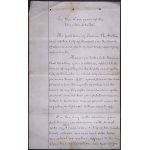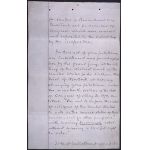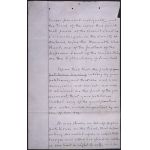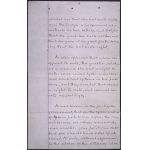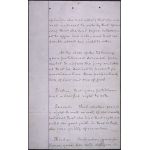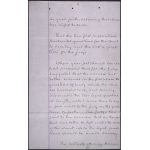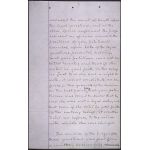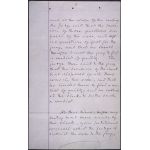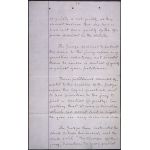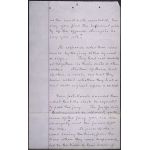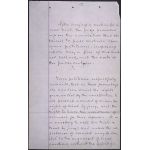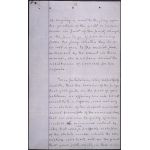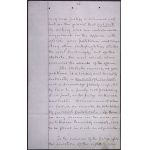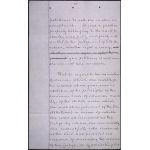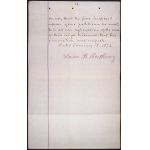Petition of Susan B. Anthony for Remission of Fine Imposed for Voting
ca. 1874
Add to Favorites:
Add all page(s) of this document to activity:
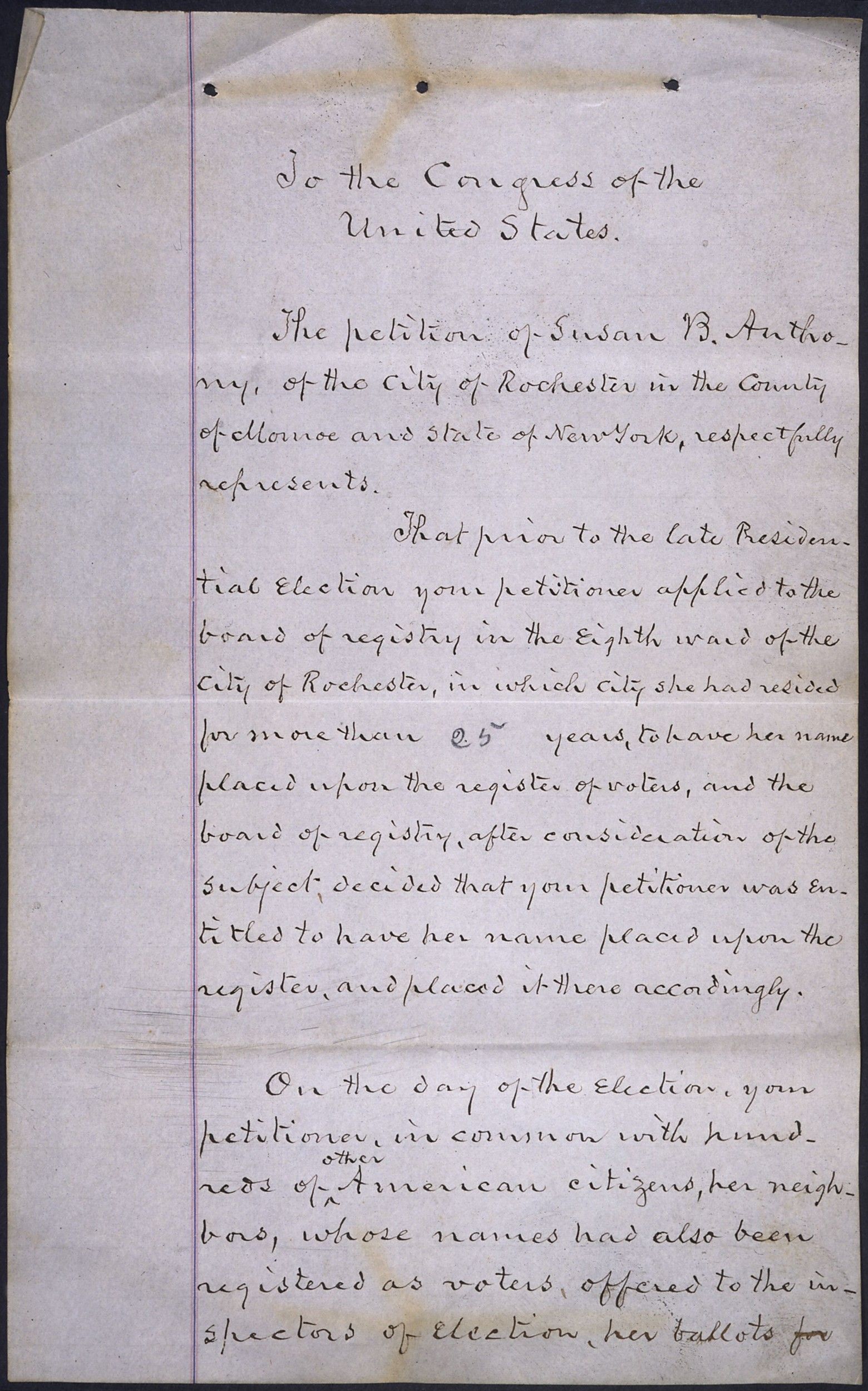
Add only page 1 to activity:
Add only page 2 to activity:
Add only page 3 to activity:
Add only page 4 to activity:
Add only page 5 to activity:
Add only page 6 to activity:
Add only page 7 to activity:
Add only page 8 to activity:
Add only page 9 to activity:
Add only page 10 to activity:
Add only page 11 to activity:
Add only page 12 to activity:
Add only page 13 to activity:
Add only page 14 to activity:
Add only page 15 to activity:
Add only page 16 to activity:
Transcript
To the Congress of the United States.The petition of Susan B. Anthony of the City of Rochester in the County of Monroe and state of New York, respectfully
represents.
That prior to the late Presidential Election your petitioner applied to the board of registry in the Eighth ward of the City of Rochester, in which city she had resided for more than 25 years, to have her name placed upon the register of voters, and the board of registry, after consideration of the
subject, decided that your petitioner was Entitled to have her name placed upon the register, and placed it there accordingly.
On the day of the election, your petitioner, in common with hundreds of other American citizens, her neighbors, whose names had also been
registered as voters, offered to the inspectors of election her ballots for
2
for electors of President and Vice President, and for members of Congress, which were received and deposited in the ballot box
by the inspectors.
For this act of your petitioner, an indictment was found against her by the grand jury, at the sitting of the District Court of the United States for the Northern District of New York at Albany, charging your petitioner, under the nineteenth section of the Act
of Congress of May 31, 1890, Entitled, "An act to Enforce the rights of citizens of the United States to vote in the several states of this union, and for other purposes." with having "knowingly voted without having a lawful right to vote."
To that indictment your peti-
3.
tioner pleaded not guilty, and the trial of the issue thus joined, took place at the Circuit Court in Canandaigua, in the County of
Ontario, before the Honorable Ward Hunt, one of the Justices of the Supreme Court of the United States, on the Eighteenth day of June last.
Upon that trial, the facts of [your petitioner having--all crossed out] voting by your petitioner, and that she was a woman, were not denied--nor was it claimed on the part of the government, that your petitioner lacked any of the qualifications of a voter, unless disqualified by reason of her sex.
It was shown on behalf of your petitioner on the trial, that before voting she called upon a respectable lawyer and asked his opinion whether she had a right to vote, and he
4
advised her that she had such right; and the lawyer was examined as a witness in her behalf, and testified that he gave her such advice, and
that he gave it in good faith, believing that she had such right.
It also appeared that when she offered to vote, the question, whether, as a woman she had a right to vote, was raised by the inspectors, and considered by them in her presence, and they decided that she had a right to vote, and received her vote accordingly.
It was shown on the part of the government, that on the examination of your petitioner before the commissioner on whose warrant she
was arrested, your petitioner stated that she should have voted if allowed to vote, without reference to the advice of the attorney whose
5
opinion she had asked; that she was not induced to vote by that opinion; that she had before determined to offer her vote, and had no doubt about her right to vote.
At the close of the testimony, your petitioner's counsel proceeded to address the jury and stated that he desired to present for consideration three propositions, two of law and one of fact:
First.-- That your petitioner had a lawful right to vote.
Second-- That whether she had a right to vote or not, if she honestly believed that she had that right, and voted in good faith in that belief, she was guilty of no crime.
Third.-- That when your petioner [sic] gave her vote she gave it
6.
in good faith, believing that it was her right to do so.
That the two first propositions presented questions for the Court to decide, and the last a question for the jury.
When your petitioner's counsel had proceeded thus far, the Judge suggested that the counsel had better discuss in the first place the
questions of law; which the counsel proceeded to do, and having discussed the two legal questions at length, asked leave then to say a few words to the jury on the question of fact. The Judge then said to the counsel that he thought that had better be left until the views of the Court upon the legal questions should be made known.
The district attorney thereupon
7
addressed the court at length upon the legal questions, and at the close of his argument the Judge delivered an opinion adverse to the
positions of your petitioner's counsel upon both of the legal questions presented, holding, that your petitioner was not Entitled to vote; and that if she voted in good faith in the belief in fact that she had a right to vote, it would constitute no defense -- the grounds of the decision on the last point ^being that your petitioner was bound to know that bylaw she was not a legal voter, and that even if she voted in good faithin the contrary belief, it constituted no defence to the crime with which she was charged.
The decision of the Judge upon those questions was read from a written document, obviously [crossed out]
8
and at the close of the reading the Judge said, that the decision of those questions disposed of the case, and leftno questions of fact for the
jury, and that he should therefore direct the jury to find a verdict of guilty. The judge then said to the jury that the decision of the Court had disposed of all there was in the case, and that he directed them to find a verdict of guilty; and he instructed the clerk to Enter such
a verdict.
At this time, before any entry had been made by the clerk, your petitioner's counsel asked the Judge to submit the case to the jury,
9.
and to give to the jury the following several instructions:
First - that if the defendant at the time of voting, believed that she had a right to vote, and voted in good faith in that belief, she was not guilty of the offense charged.
Second - That in determining the question whether she did or did not believe that she had aright to vote, the jury might take into consideration as bearing upon that question, the advice which she received from the counsel to whom she applied.
Third - That they might also take into consideration as bearing upon the same question, the fact that the inspectors considered the question, and came to the conclusion that she had a right to vote.
Fourth - That the jury had a right to find a general verdict
10.
of guilty or not guilty, as they should believe that she had or had not been guilty of the offense described in the statute.
The Judge declined to submit the case to the jury upon any question whatever, and directed them to render a verdict of guilty against your petitioner.
Your petitioner's counsel Excepted to the decision of the Judge upon the legal questions, and to his direction to the jury to find a verdict of guilty; insisting that it was a direction which no court had a right to give in any criminal case.
The Judge then instructed the clerk to take the verdict, and the clerk said, "Gentlemen of the jury, hearken to your verdict
11.
as the court hath recorded it. You say you find the defendant guilty of the offence charged. So say you all."
No response whatever was made by the jury Either by word or sign. They had not consulted together in their seats or otherwise. Neither of them had spoken a word, nor had they been asked whether they had or had not agreed upon a verdict.
Your petitioner's counsel then asked that the clerk be requested to poll the jury. The Judge said,"that cannot be allowed, gentlemen of the jury you are discharged," and the jurors left the box. No juror spoke a word during the trial, from the time when they were empannelled to the time of their discharge.
12.
After denying a motion for a new trial, the Judge proceeded upon the conviction thus obtained to pass sentence upon your petitioner, imposing upon her, a fine of one hundred dollars, and the costs of the prosecution.
Your petitioner respectfully submits that in these proceedings she has been denied the rights guaranteed by the constitution to all persons accused of crime, the right of trial by jury, and the right to have the assistance of counsel for their defence. It is a mockery to call her trial a trial by jury; and unless the assistance of counsel may be limited to the argument of legal questions, without the privilege
13.
of saying a word to the jury upon the question of the guilt or innocence in fact of the party charged, or the privilege of ascertaining from the jury whether they do or do not agree to the verdict pronounced by the court in their name, she has been denied the assistance of counsel for her defence.
Your petitioner, also, respectfully insists, that the decision of the Judge, that good faith on the part of your petitioner in offering her vote did not constitute a defence, was not only a violation of the deepest and most sacred principle of the criminal law, that no one can be guilty of crime
unless a criminal intent Exists; but was ^also a palpable violation of the statute under which the conviction was had; not on the ground
that good faith could, in this, or in
14
any case justify a criminal act, but on the ground that bad faith in voting was an indispensable ingredient in the offence with
which your petitioner was charged. Any other interpretation strikes the word "knowingly," out of the statute, the word which alone describes the essence of the offence.
The statute means, as your petitioner is advised, and humbly submits, a knowledge in fact, not a knowledge falsely imputed
by law to a party not possessing it in fact, as the Judge in this case has held. Crimes cannot Either in law, or in morals, be Established by judicial falsehood. If there be any crime in the case, your petitioner humbly insists, it is to be found in such an adjudication.
To the decision of the Judge upon the question of the right of your
15
petitioner to vote she makes no complaint. It was a question properly belonging to the court to decide, was fully and fairly submitted to the Judge, and of his decision, whether right or wrong, [crossed out] and whether made before or after the argument [end cross] your petitioner is well aware she cannot here complain.
But in regard to her conviction of crime, which she insists, for the reasons above given, was in violation of the principles of the common law- of common morality- of the statute under which she was charged, and of the Constitution; a crime of which she was as innocent as the Judge by whom, she was convicted, she respectfully asks, inasmuch as the law has provided no means of reviewing the decisions of the judge, or of correcting his
16.
Errors, that the fine imposed upon your petitioner be remitted, as an Expression of the sense of this high tribunal that her conviction was unjust.
Dated January 12_ 1874.
Susan B. Anthony
This primary source comes from the Records of the U.S. House of Representatives.
National Archives Identifier: 306559
Full Citation: Susan B. Anthony Petition for Remission of Fine Imposed for Voting; ca. 1874; Accompanying Papers of the 43rd Congress; Accompanying Papers, 1865 - 1903; Records of the U.S. House of Representatives, Record Group 233; National Archives Building, Washington, DC. [Online Version, https://docsteach.org/documents/document/anthony-petition, April 16, 2024]Activities that use this document
- Evaluating the New Departure Strategy in the Fight for Women's Suffrage
Created by the National Archives Education Team
Rights: Public Domain, Free of Known Copyright Restrictions. Learn more on our privacy and legal page.



